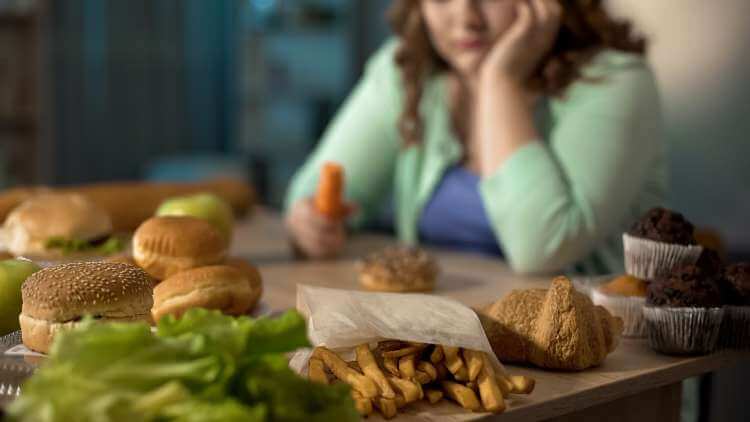
How to Stop Overeating, Lose Weight and Dramatically Improve Your Health
- Table of contents
- Why do many people overeat, and what are the consequences?
- Why you should stop overeating
- 8 Tips to tell you how to stop overeating to lose weight and improve your overall health
- Further tips to prevent overeating
- Conclusion
Why do many people overeat, and what are the consequences?
There’s no doubt about it, the majority of people who are overweight are that way simply because they eat too much. Overeating symptoms include feeling uncomfortably full after meals (perhaps even to the point of feeling nauseous), and an inevitable weight gain.
But why do so many people overeat? Surely it’s simple to say no to excess food? If you’ve ever struggled with your weight, you’ll know it’s just not that simple.
Food is much more than just fuel in today’s modern society. It’s commonly used as a way of socializing, an emotional crutch when we’re feeling low or even just simply as a hobby. Some people really do genuinely struggle to fight their constant urge to eat, and when they do eat, they eat far more than necessary to give their body the nutrition it needs.
For some people, their urge to overeat is so strong, it could be described as an addictive behavior. And with sugar said to be more addictive than cocaine, it’s easy to see how this could be true.
If you’ve spent much of your life wondering how to stop overeating and lose weight for good, you’re not alone. And with this article, we’re going to try to give you some great tips to tackle the issue head-on.
Why you should stop overeating
Overeating is extremely harmful to anyone’s health. An excess of calories in means an excess of fat stored, and unless you start to keep your appetite under control, your weight’s only going to go up and up over time.
Being overweight puts you at risk of various health issues, such as:
- Heart disease
- Diabetes
- Cancer
- Fatty liver
- Kidney disease
- Osteoarthritis
For the sake of your health and wellbeing, it’s vital to get overeating under control as soon as possible.
8 Tips to tell you how to stop overeating to lose weight and improve your overall health

1 – Stop eating while distracted
It may be your favorite thing to do – to scroll through your phone or watch tv while you eat dinner, but it’s actually causing you to think that food is much more pleasurable than it really is. To add to this, you won’t realize just how much you’ve eaten, and you won’t recognize your ‘full’ signals at all.
Next time you eat a meal, try sitting at the dinner table alone, with no distractions and just simply eating. You may be surprised to find that you’re actually quite bored and full after just a few minutes – especially if you follow this routine day after day.
The next time you watch a film, think to yourself; Is it the popcorn you’re enjoying, or the film? Would you eat that amount of popcorn if you had to sit at a table and stare at it for the entire time, or would you feel the need to stop and go to do something else?
2 – Use a smaller plate
It may seem strange, but a very useful way to trick yourself into eating less is to simply eat from a smaller plate.
Not only will you not be able to fill the plate as much as you would usually, but you’ll also feel like you’ve eaten a plateful of food – despite that plate being much smaller.
Try it – rather than a dinner plate, eat from a sandwich plate for a few days. You may just be surprised at the positive effect it has on your ability to eat less.
3 – Don’t eat when you’re upset or stressed
When our emotions are running high, we don’t think about how much we’re eating. Although it’s usually one of the first things we turn to to help us feel better, it’s a big mistake if overeating is a problem for you.
Rather than eat, why not do something else. Get some exercise, take a bath, read a book or watch a movie. Being upset is not a reason to stuff your face – and besides, you probably won’t enjoy that food as much as you would if you waited until you’ve calmed down.
4 – Slow down
Eating a meal isn’t a sprint. If you truly love eating, slow down and enjoy every mouthful properly.
It takes on average 20 minutes for the brain to receive the signal that your stomach is full, so give it that chance by taking much longer to enjoy each meal. Try to put your knife and fork down between bites and genuinely savor the flavor of each morsel.
Doing this on a daily basis at the same time as eating alone, undistracted will really make you realize that you are firstly eating, and secondly that you can actually feel full.
5 – Fill up on low-calorie foods first
This has the same effect as a gastric balloon, without the surgery!
Filling the huge void in your stomach with low-calorie vegetables, broths, or even just plain water before a meal can dramatically reduce the amount of food you consume in a sitting.
Try to drink at least a glass of water before each meal, and fill your plate with at least ¾ of low calorie veggies; you’ll be amazed at the calories you save.
6 – Track your food intake
This is as much about accountability as it is about tracking calories. Simply recording everything you eat has a very powerful effect on your appetite – specifically in helping to reduce it!
When you can see in black and white the sheer number of calories and balance of macronutrients you are consuming on a daily basis, it makes it much more likely that you’ll make some effort to curb your intake and eat more healthily. Not only this, the very act of actually having to input everything you eat into an app or diet sheet makes it easier to sometimes skip that snack!
This is also a great method to use if you’re looking for how to stop overeating at night. Once your daily calories have been fulfilled, you can simply tell yourself to stop eating – there are no more calories available for that day.
7 – Eat protein first
Protein is the single most filling food of all time – and eating it at the start of your meal will ensure that you eat fewer calories overall by the time you’ve finished.
Meats, dairy, eggs and pulses are all great sources of protein – but for a better effect, choose low-calorie and fat-free options over their full-fat counterparts.
8 – Be prepared
Preparing and freezing batches of healthy meals you can heat and use alongside frozen veg is a great way of making sure you have healthy meals at hand – which in turn reduces the number of calories you’ll consume with each meal.
Not only this, you can, of course, control your portion sizes better when they are pre-prepared (and you’re not raging with hunger while cooking it!). This really helps you to stick to only putting the right amount of food on your plate each time.
Further tips to prevent overeating
Not enough tips for you here? Take a look at this:
In addition to the above, we highly recommend you supplement with a good quality appetite suppressing supplement such as PhenQ. Not only will this help you to feel fuller for longer, it’ll help control cravings for sweet or carb-laden foods too.
Armed with all of these tips, you should be ready to battle your overeating demons right away!
Conclusion
There’s no need to feel helpless in your quest to stop compulsive overeating. By following the tips above, and thinking ahead, you could well see the end of overeating sooner than you think. And as soon as you do, it’s inevitable that healthy, regular, sustainable weight loss will happen.
Have you solved your compulsive overeating issues? What tips do you have? Tell us about them in the comments below!




